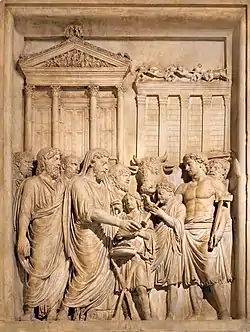| Religion in ancient Rome |
|---|
 |
| Practices and beliefs |
| Priesthoods |
| Deities |
|
Deified leaders: |
| Related topics |
In ancient Roman religion, a supplicatio is a day of public prayer when the men, women, and children of Rome traveled in procession to religious sites around the city praying for divine aid in times of crisis. A supplicatio can also be a thanksgiving after the receipt of aid.[1] Supplications might also be ordered in response to prodigies (prodigia); again, the population as a whole wore wreaths, carried laurel twigs, and attended sacrifices at temple precincts throughout the city.[2]
Supplicatio as a form of religious expression is distinct from the general sense in English of supplication as an act of beseeching following a military defeat or surrender, for which the Latin word submissio was more often used.[3]
Usage
A supplicatio was decreed for two different reasons:
As a thanksgiving, when a great victory had been gained. It was usually decreed as soon as official intelligence of the victory had been received by a letter from the general in command. The number of days during which it was to last was proportioned to the importance of the victory.
Sometimes it was decreed for only one day but more commonly for three or five days. A supplication of ten days was first decreed in honour of Pompey at the conclusion of the war with Mithridates and one of fifteen days after the victory over the Belgae by Caesar, an honour which Caesar himself says had never been granted to any one before.
Subsequently, a supplicatio of twenty days was decreed after his defeat of Vercingetorix. From this time the senate seems to have frequently increased the number of days out of mere compliment to the general. We thus find mention of thanksgivings for forty days, fifty days and even sixty.
A supplicatio was usually regarded as a prelude to a triumph but it was not always followed by one, as Cato reminds Cicero, to whose honour a supplicatio had been decreed. This honour was conferred upon Cicero on account of his suppression of the conspiracy of Catiline, which had never been decreed to any one before in a civil capacity (togatus) as he frequently takes occasion to mention.
A Supplicatio, a solemn supplication and humiliation, was also decreed in times of public danger and distress and on account of prodigies to avert the anger of the gods.
References
- ↑ Frances Hickson Hahn, "Performing the Sacred: Prayers and Hymns," pp. 238, 247, and John Scheid, "Sacrifices for Gods and Ancestors," p. 270, both in A Companion to Roman Religion (Blackwell, 2007).
- ↑ Veit Rosenberger, in "Religious Actors in Daily Life: Practices and Related Beliefs," in A Companion to Roman Religion, p. 296.
- ↑ F. S. Naiden, "Supplication on Roman Coins," American Journal of Numismatics 15 (2003) 41–43.